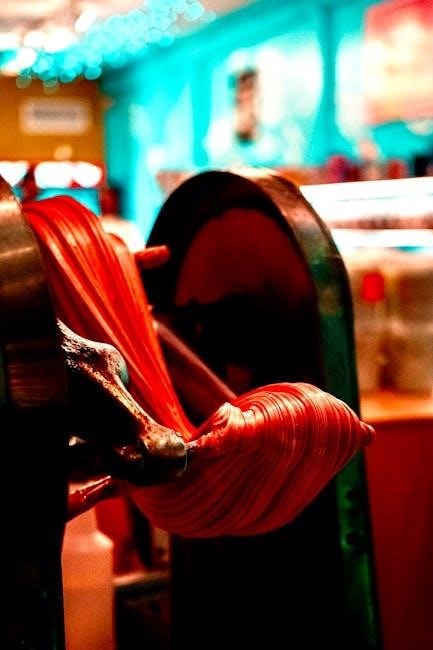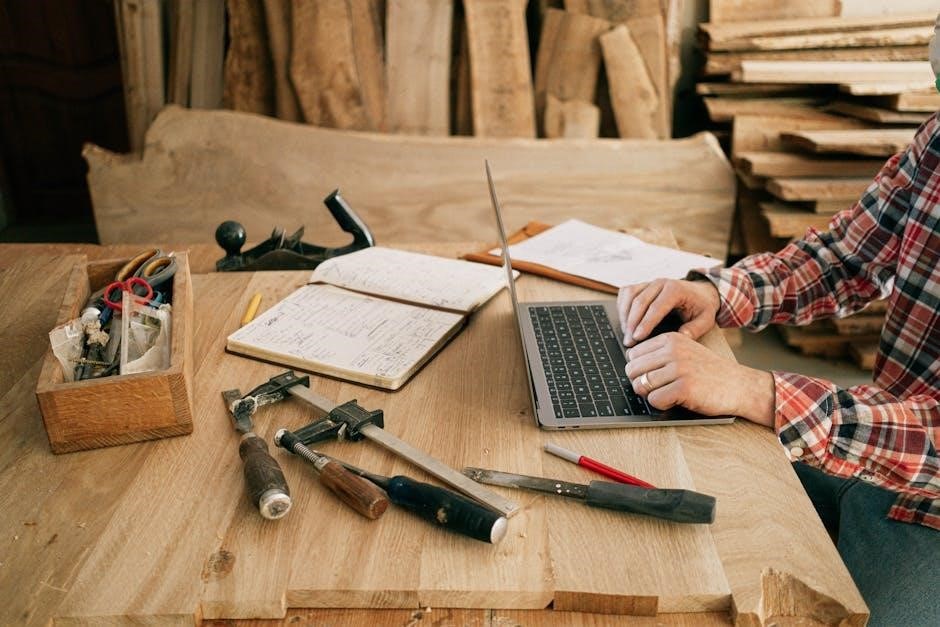The art of manufacturing blends creativity with technology, offering free PDF guides for practical applications and sustainable techniques in modern production processes and innovation.
Overview of the Concept and Its Importance in Modern Industry
The art of manufacturing represents a fusion of creativity, technology, and efficiency, driving innovation and sustainability in global industries. By integrating advanced techniques and smart technologies, it ensures high-quality production while minimizing environmental impact. The concept emphasizes the importance of continuous improvement, making it a cornerstone of modern manufacturing. Free PDF resources provide accessible knowledge, enabling industries to adopt cutting-edge practices and stay competitive in a rapidly evolving market.
State-of-the-Art Manufacturing Technologies
State-of-the-art manufacturing technologies include 3D printing, additive manufacturing, and advanced thread-cutting tools, enhancing production efficiency; Free PDF guides provide detailed insights into these innovative methods.
3D Printing and Additive Manufacturing Techniques for Sustainable Materials
3D printing and additive manufacturing revolutionize production by enabling sustainable material use, reducing waste, and optimizing energy consumption. These techniques allow for complex geometries and lightweight designs, enhancing product performance while minimizing environmental impact. Free PDF guides detail cutting-edge methods for integrating eco-friendly materials into manufacturing processes, ensuring efficiency and sustainability. These resources are invaluable for adopting modern, environmentally responsible production practices.
Advanced Thread-Cutting Tools in Shipbuilding Products
Advanced thread-cutting tools are essential for precision and efficiency in shipbuilding, ensuring high-quality thread production. These tools, designed with state-of-the-art 3D technology, optimize cutting processes for durable ship components. A free PDF guide explores their application, highlighting innovations in material handling and machining accuracy. This resource is vital for manufacturers aiming to enhance productivity and maintain superior product quality in modern shipbuilding operations.

Evolution of Manufacturing Practices
The evolution of manufacturing practices integrates smart technologies and digital solutions, driving sustainable production and innovation. This transformation enhances efficiency and reduces environmental impact significantly.
From Traditional Methods to Industry 4.0 and Smart Manufacturing
The transition from traditional manufacturing to Industry 4.0 and smart manufacturing involves integrating advanced technologies like AI, IoT, and automation. This shift enhances efficiency, reduces waste, and improves product quality. Digital tools enable real-time monitoring and predictive maintenance, fostering innovation and sustainability. The adoption of smart manufacturing practices aligns with global trends, ensuring competitiveness and adaptability in a rapidly evolving industrial landscape.
The Role of Digitalization in Modern Manufacturing Processes
Digitalization revolutionizes manufacturing by integrating AI, IoT, and automation, enabling real-time monitoring and data-driven decisions. These technologies optimize production workflows, reduce errors, and enhance efficiency. Advanced systems facilitate predictive maintenance and quality control, ensuring seamless operations. Digital tools also support sustainable practices and supply chain transparency, driving innovation and competitiveness in the industry. This transformation is essential for adapting to modern demands and achieving operational excellence.

Practical Applications of Manufacturing Art
The art of manufacturing is applied in real-world scenarios like the e-Fctory case study, where digital tools enhance the production of Yukimi Daifuku, showcasing efficiency and innovation.
Case Study: e-Fctory and the Production of Yukimi Daifuku
e-Fctory’s integration of digital tools revolutionizes the production of Yukimi Daifuku, a traditional Japanese sweet. By leveraging smart manufacturing, the process achieves precision and efficiency, reducing waste. This case study highlights how digital innovation enhances traditional craftsmanship, making it a prime example of the art of manufacturing in action, as detailed in the free PDF guide.
Implementation of LED Lighting in Factories for Efficiency
Factories are adopting LED lighting to enhance efficiency, reduce energy consumption, and lower operational costs. This modern approach improves visibility, ensuring safer working conditions and boosting productivity. The implementation of LED lighting is a key aspect of sustainable and smart manufacturing, as highlighted in the free PDF guide on the art of manufacturing, emphasizing its role in optimizing production processes.

Sustainable Design and Manufacturing
Sustainable design and manufacturing focus on integrating advanced technologies like 3D printing for eco-friendly materials, as detailed in the free PDF guide on modern production practices.
Latest Advances in Sustainable Materials and Processes
Recent advancements in sustainable manufacturing include cutting-edge 3D printing techniques and additive manufacturing, enabling the use of eco-friendly materials like biodegradable polymers and recycled metals. These innovations reduce environmental impact while maintaining product quality. The free PDF guide highlights such processes, showcasing how modern technologies promote greener production methods and support circular economy principles, ensuring a balance between efficiency and sustainability in manufacturing practices.
Environmental Impact Reduction Through Smart Manufacturing
Smart manufacturing leverages advanced technologies to minimize waste and optimize resource use, significantly reducing environmental impact. By integrating energy-efficient systems and sustainable practices, modern factories achieve lower carbon emissions. The free PDF guide elaborates on these strategies, highlighting how intelligent production processes contribute to greener operations and support global sustainability goals in the manufacturing sector.
Training and Workforce Development in Manufacturing
Training and workforce development in manufacturing emphasize trade skills and engaging young talent through programmes, supported by free PDF guides for building future-ready expertise.
Importance of Trade Skills Training for Future Manufacturers
Trade skills training is crucial for equipping future manufacturers with hands-on expertise, enabling them to adapt to advanced technologies and solve complex production challenges. Free PDF guides provide accessible resources for mastering these skills, ensuring a workforce ready to drive innovation and efficiency in the evolving manufacturing landscape.
Engaging Young Talent Through The Art of Manufacturing Programme
The Art of Manufacturing programme is inspiring over 5,000 youngsters by making manufacturing fun and accessible, encouraging them to pursue careers in the automotive and related industries. This initiative fosters creativity and innovation, equipping the next generation with essential skills. Free PDF resources and interactive learning tools further support their journey, ensuring a future workforce ready to lead in smart manufacturing and Industry 4.0.
Art and Creativity in Manufacturing
Art and creativity in manufacturing foster collaboration between artists, makers, and manufacturers, integrating innovative designs into production processes. Discover more in the free PDF guide.
Collaboration Between Artists, Makers, and Manufacturers
Collaboration between artists, makers, and manufacturers fosters innovation, blending creative design with industrial expertise. This partnership enables the integration of artistic elements into production processes, enhancing product aesthetics and functionality. Artists bring unique perspectives, while manufacturers provide technical know-how, creating a synergy that drives sustainable and innovative manufacturing practices. The free PDF guide on the art of manufacturing highlights successful case studies and techniques for fostering such collaborations.
Integrating Artistic Elements into Production Processes
Integrating artistic elements into production processes enhances creativity and functionality in manufacturing. This approach combines aesthetic design with technical precision, resulting in unique and innovative products. Artists and manufacturers collaborate to infuse visual and cultural elements, creating value beyond traditional production methods. The art of manufacturing PDF guide provides insights into how artistic integration can lead to sustainable and visually appealing outcomes, enriching the manufacturing landscape.

Resources for Learning and Downloading Manufacturing Guides
Access comprehensive guides on manufacturing through free PDF downloads, offering insights into sustainable techniques, smart factories, and innovative production methods for enhanced learning and application.
Free PDF Downloads of The Art of Manufacturing
Discover the Art of Manufacturing through free PDF downloads, offering in-depth insights into sustainable design, smart factories, and innovative production techniques. These resources provide practical knowledge on cutting-edge technologies like 3D printing and Industry 4.0, ensuring manufacturers stay ahead in modern production. Download guides, case studies, and eBooks to explore the fusion of creativity and technology in manufacturing processes, all accessible at no cost for enhanced learning and application.
Recommended Websites and Libraries for Manufacturing Resources
Access comprehensive manufacturing resources through websites like Packt and libraries such as the Internet Archive. These platforms offer free PDF downloads of eBooks, guides, and case studies on sustainable manufacturing, smart factories, and innovative production techniques. Visit gpif.go.jp for investment reports and Plan A Earth for sustainability insights, essential for manufacturing professionals.
Challenges and Future Trends in Manufacturing
Manufacturing faces challenges like maintaining reliability and efficiency while adopting smart technologies. Future trends include advancements in Industry 4.0, automation, and sustainable practices, as detailed in free PDF guides.
Ensuring Reliability and Efficiency in Manufacturing Operations
Reliability in manufacturing operations depends on advanced tools, skilled workforces, and optimized processes. Efficiency is enhanced through digital solutions, smart technologies, and sustainable practices, as outlined in the art of manufacturing PDF guides. These resources emphasize cutting-edge techniques to maintain high performance and reduce operational challenges, ensuring future-ready production systems.
Future Predictions for Smart Manufacturing and Industry 4.0
Smart manufacturing and Industry 4.0 are expected to revolutionize production through advanced automation, AI, and IoT. These technologies will optimize processes, enhance sustainability, and enable real-time monitoring. The integration of 3D printing and additive manufacturing will further drive innovation. The Art of Manufacturing PDF guides highlight these trends, projecting a future where factories achieve unprecedented efficiency, reduced environmental impact, and higher product quality through intelligent systems and digital transformation.
The art of manufacturing emphasizes continuous innovation, blending creativity with technology. Free PDF resources provide insights into sustainable practices, fostering growth and efficiency in modern production.
Summing Up the Key Points of The Art of Manufacturing
The art of manufacturing integrates innovation, sustainability, and efficiency, leveraging smart technologies and digitalization to enhance production processes. Emphasizing workforce development and creative collaboration, it ensures high-quality outcomes while minimizing environmental impact. Free PDF resources offer practical insights, from 3D printing to Industry 4.0, inspiring continuous improvement and fostering a skilled, future-ready manufacturing sector.
Final Thoughts on the Importance of Continuous Innovation
Continuous innovation is the backbone of manufacturing progress, driving sustainability and efficiency through advanced technologies like 3D printing and Industry 4.0. Free PDF resources provide valuable insights, enabling manufacturers to adapt and thrive in a rapidly evolving industry. By fostering creativity and investing in smart manufacturing, the sector ensures long-term growth, environmental stewardship, and a skilled workforce ready to meet future challenges.
